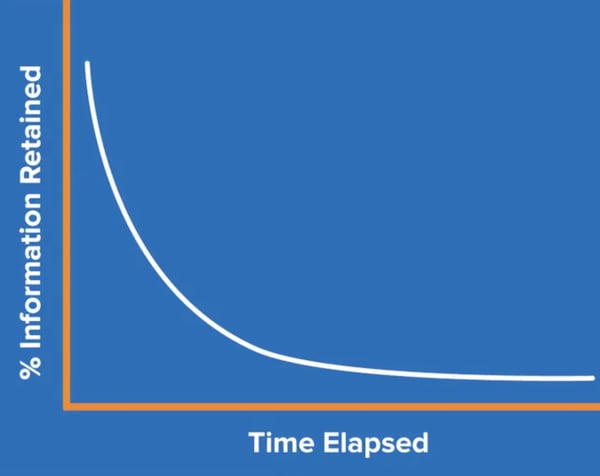"In today's sales environment, generic training is a recipe for mediocrity. The top 5 must-haves – Engaging Content, Accessibility, Customization, Soft Skills Focus, and Role-Playing – are the new foundation for building high-performing sales teams. Embrace these elements, and you'll unlock a new era of sales success."
Is Your Sales Team Stuck in the "Generic Training Trap"?
Did you know that 70% of salespeople lack formal training, and 82% of B2B buyers say reps are unprepared to meet their needs?511 If your team is still relying on one-size-fits-all training, you’re not just risking mediocrity—you’re leaving revenue on the table.
Ask yourself:
-
Are your reps drowning in forgettable slide decks while competitors use AI-driven role-play simulations to master real-world scenarios?
-
Do your training programs feel like a chore, with content retention dropping to 16% after three months?
-
Is your sales leadership stretched too thin to provide real-time coaching, even though teams with structured coaching see 28% higher win rates?
Corporate sales training is not only an investment in your business. It is an investment in your talent, your client relationships, and ultimately your sales success.
A company with a good corporate sales training program will build on its team's capabilities to deliver and keep up with the market's evolving needs. It helps them stay competitive, builds their motivation, and empowers them to win at business.
Businesses that fail to establish a good corporate sales training program risk wasting their budget, and let's be honest, we don't have that kind of money to waste in today's volatile economy.
In this article, we cover the top five corporate sales training must-haves that every winning sales team needs in today's uncertain business landscape.
Ready to ditch the “spray-and-pray” training model? Let’s dive into the pillars that will transform your team from order-takers to deal-makers.
What's in this post?
1. What is a corporate sales training program?
2. What does a successful corporate sales training program look like?
3. Invest in effective sales training
What is a corporate sales training program?
An organization's sales team is like the engine of a business.
Without an effective sales team, driving revenue is going to be very difficult. That's why leading businesses today invest so much time and money into curating a successful sales training program.
Corporate sales training programs are designed to up-skill sales representatives selling techniques and methods, with the overarching goal of attracting more leads, closing more deals, and ultimately driving revenue growth.
There are several ways of training employees. Some common ways that organizations establish corporate sales training programs are:
- In-person, seminar programs
- A.I.-powered immersive training programs
- Online course-style training programs
To learn more about the best B2B sales training programs, click here or below.
What does a good corporate sales training program look like?
1. Training content is ENGAGING.
“If learners think it looks bad, you may have lost a good percentage of the battle in getting them to pay attention.” - Patti Shank, President, Learning Peaks, LLC.
Imagine you're a sales representative at a company, and your learning and development (L&D) leader has organized a training program. You take a look at the schedule, which is a 3-hour lecture-based seminar with a sales expert and hundreds of other sales reps sitting in the room. You attend the seminar, probably yawning as you walk out. Weeks later, you have to admit, you aren't actually able to recall too much of what you learned.
But as a matter of fact, that shouldn't be much of a surprise. German psychologist Hermann Ebbinghaus's Forgetting Curve explains why. His visual representation of the way that learned information fades over time is exactly why lecture-based annual sales training sessions FAIL.
So what does that mean for L&D leaders who want their sales reps to retain the information absorbed during training?
The answer lies in cultivating a culture of continuous growth.
This second image visualizes how periodically reviewing content helps our brains store information in our long-term memory, which makes recollection faster and the ability to remember training content much easier.
Memory may fade quickly, but having access to training continuously improves retention rates immensely.
2. Training content is ACCESSIBLE FROM ANYWHERE.
The pandemic gave us all a swift and shocking reminder about how important it is to be adaptable. We're witnessing a business environment that is more volatile than ever, and let's be honest.. it's likely that we'll feel the effects of the pandemic for many years to come, and the learning and development space is certainly no exception.
“A one-size-fits-all approach doesn’t fit with our aspirations anymore. We like the idea of being able to learn when we want, how we want, in different spaces – reflecting the changing nature of work.” - Professor Kiran Trehan, Pro-Vice-Chancellor for Partnerships and Engagement, University of York
That's where accessibility becomes key for training. Sales reps can't rely on physically being present in a training workshop in order to access training programs anymore. They need to be able to access it anywhere, anytime.
In fact, e-learning and A.I. training platforms have transformed the learning space in the wake of the pandemic. With over half of American workers being offered home-office flexibility at least once a week, companies are wise to adopt policies and invest in emerging technologies and train employees to create a way for both in-person and off-site workers to train.
3. Training is CUSTOMIZED.
Unless the skills application exercises in a training program are customized for the business, sales reps are going to have a hard time applying the learned skills to their job. If reps feel like the training is relevant to them, it's going to be a waste of their time.
So how can L&D leaders pick sales training programs that are customizable?
Video-based training programs, for instance, have been one of the breakout trends due to their customizable, interactive nature. Video is quickly becoming the standard e-learning format, due to its high engagement rates. In fact, video has become one of the most popular ways to deliver and consume content.
One of Germany's largest automotive manufacturers currently uses an A.I.-powered video training platform, Retorio, to upskill their sales staff. By using a training platform focussed on video, it allows their sales reps to:
- Practice client interactions with personalized role-play style training that they can directly apply to real-life conversations.
- Access training from wherever they are on the globe, whenever they want.
- Get personalized feedback from the A.I.
- Practice soft skills which are vital for their client conversations.

4. Focussing on training SOFT SKILLS.
A Deloitte study finds that soft skill-intensive occupations will account for two-thirds of all jobs by 2030. Soft skills are also referred to as employability skills, enterprise skills and they are transferable between industries and occupations. They include things like communication, teamwork, and problem-solving, as well as emotional judgment, professional ethics, and global citizenship.
AI-powered video training platforms have been gaining a lot of attention in the remote training scene, particularly for training soft skills. Its AI combines video analysis with role-plays of client simulations to offer interactive training solutions for customer-facing roles, such as sales and consulting., etc.
To learn more about mastering soft skills training remotely, click here.
.webp?width=600&height=490&name=Retorio%20Training%20and%20Learning%20(1).webp)
5. Training includes ROLE-PLAYING
"Knowing is not enough; we must apply. Wishing is not enough; we must do."
- Johann Wolfgang Von Goethe
There is no one-size fits all technique to selling. Every client has varying desires, personalities, motives, and there is no straightforward recipe to win a client conversation. Leading successful client conversations takes practice, and that's why using role-playing is a way for sales managers to build a strong team and help them maintain high-performance long term.
When training offers role-playing scenarios, sales reps are able to practice leading those difficult-to-handle conversations, such as an argumentative customer, a customer whose into the nitty gritty details of a product or service, and the list goes on.
| MUST-HAVE | Description | Retorio Solution |
| Engaging Content | Training that captures attention and improves knowledge retention. | Interactive video simulations, gamification, personalized feedback. |
| Accessible Content | Training available anytime, anywhere, supporting remote teams. | Cloud-based platform, mobile-first design, on-demand access. |
| Customized Training | Tailored training relevant to specific roles and business needs. | Personalized learning paths, AI-driven feedback, role-specific simulations. |
| Focus on Soft Skills | Training that prioritizes interpersonal skills for sales effectiveness. | Video-based role-play simulations, AI-powered soft skills analysis and feedback. |
| Includes Role-Playing | Training incorporating practice and application through realistic scenarios. | Interactive AI role-play simulations, scenario-based training, feedback mechanisms. |
Why it's a MUST-HAVE:
- Bridging the Knowing-Doing Gap: Role-playing bridges the gap between theoretical knowledge and practical application, allowing reps to actively practice and internalize learned skills.
- Safe Practice Environment: Provides a safe, low-stakes environment for reps to experiment with different sales techniques, make mistakes, and learn from them without fear of real-world consequences.
- Develops Confidence and Fluency: Practice through role-playing builds confidence and fluency in handling various sales scenarios, making reps more comfortable and effective in real client interactions.
- Identifies Areas for Improvement: Role-playing sessions provide opportunities for managers and peers to observe rep performance, identify specific areas for improvement, and provide targeted feedback.
How to Implement It:
- Realistic Scenario Design: Develop role-playing scenarios that are realistic, relevant to your industry and target customers, and cover a range of common sales situations and challenges.
- Varied Role-Play Formats: Incorporate different role-play formats, such as one-on-one role-plays, group role-plays, and simulations, to provide diverse practice opportunities.
- Constructive Feedback Mechanisms: Establish clear guidelines and mechanisms for providing constructive feedback during and after role-playing sessions, focusing on specific behaviors and areas for improvement.
- Video-Based Role-Playing: Utilize video recording of role-playing sessions for self-review, peer feedback, and AI-powered analysis, enabling deeper insights and more objective feedback.
- AI-Powered Role-Play Simulations: Leverage AI sales coaching platforms like Retorio that offer interactive, AI-driven role-play simulations, providing personalized feedback and scalable practice opportunities for every rep.
Invest in effective sales training
Building sales capabilities is no easy task on a good day. Sales reps are constantly dealing with all kinds of scenarios, from argumentative clients to customers who think they know it all. But to keep up with the volatile business environment and its evolving needs, L&D leaders need to make sure they bring their A-game when it comes to curating a training program.
Unfortunately, the majority of training programs that sales organizations offer are ineffective and boring. They often don't offer the interactivity that keeps learners engaged, they aren't accessible globally and they don't offer a way to train sales reps' soft skills.
However, executives that are one step ahead view effective training programs as an opportunity to drive a high return on investment. By training their most valuable asset, their talent, they're investing in their ability to deliver future results.
Want to test out how AI-powered immersive training platforms could train your sales reps today?







